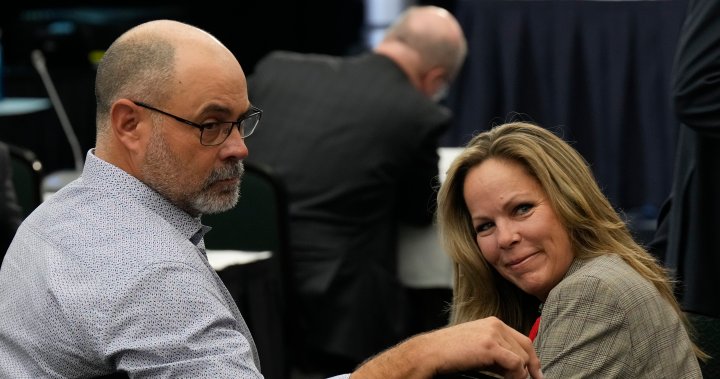Crown prosecutor Tim Radcliffe says that “Freedom Convoy” organizers Tamara Lich and Chris Barber’s political views are not on trial, but rather the means they allegedly employed to achieve their ends.
The charges of mischief, obstructing police, counselling others to commit mischief, and intimidation stem from the demonstration that saw hundreds of trucks and thousands of people encamp across much of the parliamentary precinct and surrounding parts of downtown Ottawa.
This lasted for three weeks in late January and into February, 2022.
The stated goal of the convoy was to have the government repeal COVID-19 vaccine mandates and passports.
After the federal government took the unprecedented step and invoked the Emergencies Act, a massive police operation cleared Ottawa’s downtown of trucks.
Many people were arrested, including Lich and Barber.

About 40 spectators and around a dozen reporters filled the courtroom for the start of the high-profile trial, which is expected to last for 16 days.
One of the spectators told Lich “you have a beautiful soul” as she entered the courtroom.
The Crown will have 10 days to present their evidence, which includes 22 witnesses.
Crown prosecutor Tim Radcliffe says this includes senior leadership form the Ottawa Police Service, members of the OPS liaison team, senior officials with the City of Ottawa and the mayor’s office plus downtown Ottawa residents and some people who work in the area.
The defence will have three days to make their case, plus three more days to cover any extra evidence.

Lich’s lawyer, Lawerence Greenspon put forward a motion to block nine Crown witnesses from the list of downtown Ottawa residents and businesses. This includes Zexi Li, who is notable for getting a court injunction to stop the near constant horn honking at the start of the protest.
Greenspon is also seeking to have witnesses from the Chateau Laurier, a prominent hotel near Parliament, and OC Transpo not be called.
Radcliffe argues that Lich and Barber were key figures orchestrating the Freedom Convoy and had control over where trucks were parked and their conduct. He told the court he plans to demonstrate this with 50 videos and public statements made during the course of the demonstration.
“They counselled people to come and stay in Ottawa with the infamous ‘hold the line’ rallying call,” Radcliffe said.
Radcliffe says the defence will likely argue Lich and Barber were exercising their constitutional rights of freedom of expression and assembly. He argues Lich and Barber’s role in the convoy goes well beyond the simple expression of charter rights with its impact on downtown Ottawa residents and workers.
“Not only did they hold the line for weeks, they crossed the line and committed multiple crimes,” Radcliffe said.

Through Radcliffe’s opening statement he used the term “occupy” and “occupation” to describe the convoy protest. Both Greenpson and Barber’s counsel, Diane Magas, took issue with this wording.
The defence argued the legal definition of occupation has to do with a hostile power occupying sovereign territory.
“The use of the word is inflammatory, inaccurate, and insensitive to those living through occupation,” Magas said.
Perkins-McVay said that statements from the Crown and defence are not evidence and she will not stop either party from using language that they see fit, but will address concerns throughout the trial.

In her opening statement, Magas said that Barber assisted police multiple times thoughout the demonstration in moving vehicles. She said that police came to Barber multiple times throughout the three weeks for assistance in this and said that he complied.
Following Barber’s arrest on February 17, Magas said that he was released on February 18 and quickly began the process of returning to Saskatchewan so he could not have counselled others to stay during the police enforcement.
The Crown’s first witness was Const. Craig Barlow with the Ottawa Police Service.
Questions for Barlow centered around a compilation of police video of the protest that he complied at the request of the Crown. They requested he show the first horn-filled weekend, second quieter weekend, final days of the protest and police action, aerial shots of traffic congestion and the encampment established behind the Courtyard by Marriot on Coventry Road.
Barlow said the 38 clips in the almost 12-minute video are very representative of his experience with the convoy. The officer added he’s gone over “days worth” of video from the convoy between police video, social media and news reports.
In cross examination, Greenspon asked if the congestion showed in the video is as bad as it gets. Barlow responded that he felt like he was being asked to give a baseline he didn’t have reference too.
Greenspon proceeded to ask if it ever crossed his mind that video from the February 18 and 19, the main enforcement days, took place after Lich and Barber had been arrested.
Barlow said it did not.
Greenspon then said it was mostly people in the crowd on those days shouting “hold the line,” and rhetorically asked if that counts as encouraging people to stay.
Magas centered her questions around other pieces of video not included in Barlow’s compilation, such as people hugging and bouncy castles that were set up on Wellington. Barlow said he wasn’t asked to include that.
She asked for copies of all the videos he reviewed, and he replied that wouldn’t be possible.
“I don’t want to be flippant or rude… but I retire in five years and I don’t think I could do that in five years,” he said.
Barlow noted he’s been looking at convoy videos all day, every day since March while working. He agreed to send a list of videos used for the compilation tape through the Crown.
Sitting days will run from 10 a.m. -12:30 p.m. and then from 2 p.m. – 4:30 p.m.
With files from Global’s Jillian Piper.



